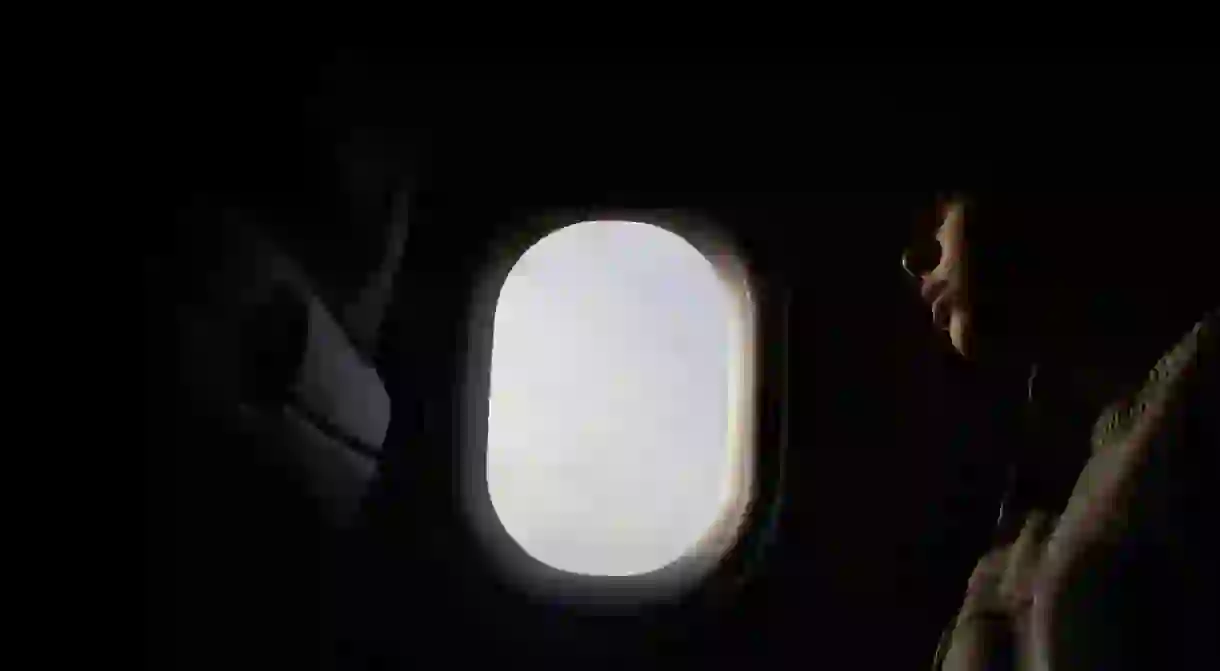Panic Attacks at 37,000 Feet and Managing Travel Anxiety

Anxiety finds me at 37,000 ft. (11, 300m) above the Pacific Ocean, somewhere between Tokyo and Los Angeles. My thoughts begin to swirl up around me like dirt kicked up in the wind. My chest tightens as though an invisible hand has clenched my heart in its fist. My breathing becomes shallow as the panic begins to rise.
I’m surprised to find anxiety here. I imagine my anxiety as some sort of trench-coat clad debt collector, pulling its beige collar up around his face, smugly taking a seat next to me and robbing me of any confidence I might have had five minutes ago. I wonder if he has been lurking behind corners this entire time, trailing me from Thailand and Vietnam to Japan, waiting for the moment to present himself at my most vulnerable.

There is no rhyme or reason to this anxiety, just a certain irony to the juxtaposition of being a travel editor who faces this adversary when straying too far from my comfort zone. Anxiety is new to me, a weed in the garden of my life that has wrapped its vines around me in the past five years. According to Melissa Horowitz, PsyD, Director of Clinical Training at the American Institute for Cognitive Therapy, “anxiety is a common emotional experience that people tend to have in response to a perceived threat or being in a perceived dangerous scenario.”
I find myself speaking to Horowitz one crisp, March day in New York, exploring ways travelers can manage their anxiety when somewhere far flung. The first thing Horowitz makes clear is that there is a difference between anxiety and clinical anxiety. “Everyone experiences anxiety,” explains Horowitz. “We want to experience anxiety; it’s an emotion that keeps us alert, vigilant and helps us solve problems. If someone has a random panic attack—it’s not atypical as most people experience a panic attack in their lifetime—but if someone has frequent panic attacks, then that’s something different.”
At the American Institute for Cognitive Therapy, Horowitz and her team offer cognitive behavior therapy to patients struggling with anxiety. Horowitz describes the therapy as being focused on the present. “We examine how patterns of thinking and behaving negatively impact one’s mood and provide strategies to modify these patterns,” she explains.
My personal strategies to chase anxiety away run the gamut (and must be said, are hardly professional). From heavy breathing, to counting, to sipping kava tea; I become somewhat sloppy when anxious—grasping at everything short of a lucky rabbit foot to calm my mind and ease the palpable panic.

Speaking to Horowitz about calming anxiety while abroad, she recommends creating a plan when traveling. “People will sometimes over-schedule or under-schedule their travels, and this could lead to stress. If that happens it’s important to take a pause and adjust the schedule accordingly.” In other words, if you’ve tasked yourself with seeing all of Paris in a mere 24 hours, this jam-packed schedule can create unnecessary stress. It’s important to remain flexible.
For all its wonder, travel can be conducive to anxiety. Jet lag, for example, can lead to more stress for travelers prone to anxiety attacks. “Something that may trigger anxiety while traveling is a change to one’s sleep schedule,” adds Horowitz. “Developing a temporary sleep routine while traveling can help.” Also, eliminating alcohol consumption is a tactic to avoid aggregating anxious tendencies.
While there are ways to adjust our schedules to sidestep a panic attack, anxiety often stems from a fear of the unknown. Rather than fight with those pesky “what if” thoughts, Horowitz suggests confronting them. A fear of not enjoying your trip, fighting with a friend or getting lost can be countered with a series of questions about how you would handle yourself in that “what if” scenario.

In fact, those “what if” worries can often be separated into what Horowitz calls unproductive, versus productive worries. A productive worry, for example, could be a fear that the elevator to the top of the Eiffel Tower will be full and you’ll miss your chance to see the view. This worry has steps that can be taken to alleviate it, such as research and advance planning. An unproductive worry, on the other hand, is irrational and ruminates on things beyond our control like the fear that you won’t have a good time in Paris.
Horowitz recommends taking 20 minutes a day to write down our unproductive worries and then let them go. This exercise aims to train our minds to recognize the difference between our worries and ultimately manage our anxiety. “Acceptance of what we don’t know is important,” says Horowitz. “Most of us don’t have the ability to know exactly what’s going to happen in the future. We can make reasoned estimations, but that is the extent of it. Accepting what one doesn’t know can help build up tolerance for uncertainty.”
If already in the throes of an anxiety attack, Horowitz suggests deep breaths and trying to change our emotional state. What if we replace our fear of loneliness while solo traveling with curiosity? All of a sudden, those thoughts shift to questions of who you’ll meet, what you’ll see and the experiences you’ll have.

As I settle into my own plane seat, I try now to shift my own emotions and ignore the looming stares of anxiety. After a few minutes of deep breathing, warm tea and the melodic sounds of La La Land, I am able to breathe again. My anxiety—that trench-coat clad goon—hovers by the cabin door just long enough to flick his cigarette and give me one last knowing look, as if to say, “I’ll be back.”
I stare back, defiantly. I’ll be ready.













